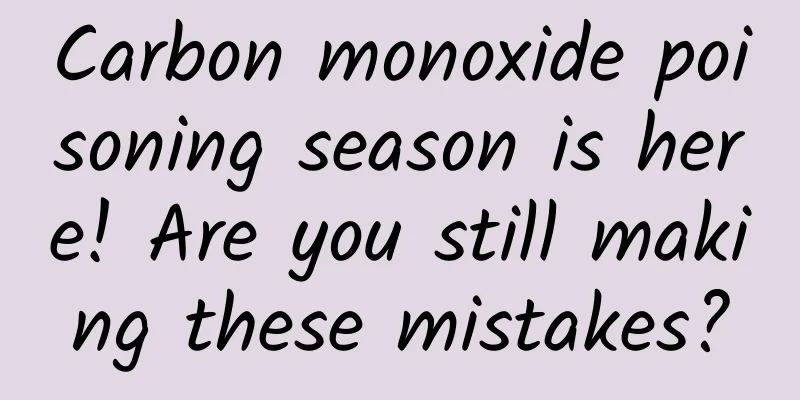Carbon monoxide poisoning season is here! Are you still making these mistakes?

|
Winter is the peak season for carbon monoxide poisoning Which scenarios are likely to cause carbon monoxide poisoning? How to identify and prevent it? What should I do if I am poisoned? Please keep this safety tip! 01 Which scenarios are likely to cause carbon monoxide poisoning? 1. Use coal stoves or charcoal for heating in an unventilated or poorly ventilated environment. 2. Gas, water heaters, and stoves are improperly used and installed, and ventilation is not effective. 3. Keep the air conditioner on for a long time in a parked, enclosed car. 4. Use unqualified or aging gas equipment. 02 How to identify carbon monoxide poisoning? 1. Mild poisoning: Symptoms such as headache, dizziness, panic, nausea, vomiting, heart palpitations and weakness in the limbs may occur. Image source: Pixabay 2. Moderate poisoning: In addition to the symptoms of mild poisoning, the skin and mucous membranes appear cherry red, and symptoms such as sweating, arrhythmia, irritability, slow movement, drowsiness, and coma continue to worsen. 3. Severe poisoning: The patient will enter a coma, experience paroxysmal or forced convulsions, pale or cyanotic complexion, decreased blood pressure, and dilated pupils. The mortality rate of patients with severe poisoning is high, and even those who survive may have serious sequelae. 03 What to do after carbon monoxide poisoning? l Open windows for ventilation immediately and quickly turn off gas stoves, water heater valves and other equipment. l Quickly transfer the patient to a place with fresh air and good ventilation. The patient should rest quietly and keep warm. l Ensure that the patient's airway is open and keep him/her lying on his/her side to prevent suffocation due to inhalation of vomitus. l For those with coma or convulsion symptoms, ice packs can be placed on the head to reduce cerebral edema. l While providing first aid on site, call 120 emergency number as soon as possible. 04 Key points for preventing carbon monoxide poisoning 1. Pay attention to ventilation. Ventilate frequently to keep the indoor air fresh; when using coal, charcoal fire and other heating equipment indoors, the coal should be burned out and not covered. Image source: Pixabay 2. Choose a good stove. The coal stove used for heating should be equipped with a chimney, and the chimney structure should be kept tight and well ventilated to prevent smoke leakage and backflow; regularly check the stove, maintain and clean the chimney and air scoop, and seal the chimney interface with tape. 3. Correct installation. When using a gas water heater, it is forbidden to install it in the room. It should be installed outside the bathroom near the window or outdoors. 4. Open windows regularly for ventilation. Do not sleep in a car with doors and windows closed and air conditioning on; open windows regularly for ventilation when driving long distances. 5. Install an alarm. Families or restaurants that use gas stoves or coal stoves should install an alarm to promptly sound the alarm if the concentration exceeds the standard. Regular inspections and maintenance should be carried out to ensure that the alarm is in normal use. Preventing Carbon Monoxide Poisoning Don't be careless Beware of these common misunderstandings and potential risks Myth 1: Only burning coal can cause poisoning Incomplete combustion of any fuel containing carbon can produce carbon monoxide. Myth 2: No smoke or odor will not cause poisoning Carbon monoxide is a colorless, odorless, non-irritating gas that cannot be directly perceived by the human body. Myth 3: There are gaps in doors and windows, so there will be no poisoning The specific gravity of air is 1, and the specific gravity of carbon monoxide is 0.967. If the gaps between doors and windows are at low positions, carbon monoxide will not be easily discharged. Myth 4: Installing a pipe or wind pipe will not cause poisoning In fact, if there is a strong wind and smoke is blown back, the chimney is blocked, etc., carbon monoxide cannot be discharged, and poisoning will also occur. If the family uses an old wind scoop, or the wind scoop is too small, or the installation height is not high enough, carbon monoxide cannot be discharged smoothly, which can also cause poisoning. Myth 5: If you leave the scene after being poisoned, you will be fine After carbon monoxide poisoning, even if you are out of the environment, you still need professional treatment, otherwise there may be a risk of delayed encephalopathy. Myth 6: Placing a basin of water next to the stove can prevent poisoning Science has proven that carbon monoxide is extremely insoluble in water and has no preventive effect. Source: Chongqing Banan District Second People's Hospital Audit experts: Du Guo, Bao Zhonghui Statement: Except for original content and special notes, some pictures are from the Internet. They are not for commercial purposes and are only used as popular science materials. The copyright belongs to the original authors. If there is any infringement, please contact us to delete them. |
<<: When traveling long distances, beware of "economy class syndrome"!
Recommend
One article will clarify the product’s pain points, itching points, and selling points!
What does marketing rely on to start? In the fiel...
How to increase followers and traffic through Xiaohongshu?
Xiaohongshu is a platform that focuses on communi...
Will native applications be replaced by web applications and new browsers?
A common refrain about the future of mobile is th...
Secret: When is the cheapest time to buy a mobile phone? Insiders teach you how to save money, please keep it low-key
In recent months, many mobile phone manufacturers...
5,000 years ago, there were three-story buildings here!
About 5,000 years ago, the middle reaches of the ...
Movement Disorders: COVID-19 infection may increase risk of Parkinson's disease, study finds
According to a recent study, the coronavirus can ...
90s hacker hacks Shanghai Disneyland ticket: buys 1 cent and earns 500,000 in a week
Data officially released by the Walt Disney Compa...
Wang Lin, 60 Lectures on the Business Philosophy of Hu Xueyan, the Richest Man
Hu Xueyan, a red-topped businessman who worked hi...
Can it replace the game mode? The focus mode updated in the official version of iOS 15 is surprisingly practical
Game mode is not some black technology. In essenc...
How should the boss spend 10 million? Mainstream promotion channel combination strategy
From this article, you can learn about the mainst...
Transferring patents to Ericsson, the patent troll that defeated Huawei, is a wise move
Unwired Planet is a patent-holding company that p...
Huawei responds to US ban on Chinese 5G: Restricting Huawei will not make the US stronger
[[265442]] The US blockade of China's 5G tech...
"New Intelligence + New Energy" in Parallel: Xijing Technology Assists Global Logistics in Intelligent Green Evolution
The 6th China International Import Expo was held ...
Teach you a trick to scan old photos losslessly to your phone, especially clear, and save them forever
Today I will teach you a method to scan old photo...
How much does it cost to create a beauty app in Deyang?
The factors affecting the quotation of Deyang Bea...









